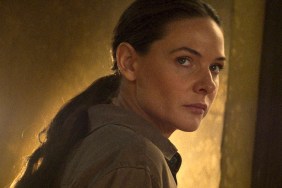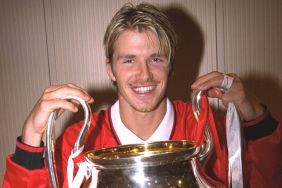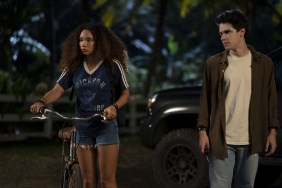It’s been almost seven years since British filmmaker Joel Hopkins made his debut with the Sundance favorite Jump Tomorrow, a movie that helped get people interested in his work, and now he’s back with his second movie Last Chance Harvey, another romantic comedy that brings people together from different backgrounds and cultures. This time, Hopkins was able to assemble a dream cast including established Oscar-winning actors Dustin Hoffman and Emma Thompson, something that should greatly help his second movie get even more attention.
In the movie, Hoffman plays Harvey Shine, a divorced jingle musician who travels to London to attend his estranged daughter’s wedding, and as he deals with jetlag and family conflicts, he ends up meeting Kate (Thompson), a 40-year-old statistician trying to live her own life despite the ever-present clutches of her overbearing mother. The two very different people form a bond as they spend time together walking around London and attending the actual wedding where she gets Harvey to stand up to his ex-wife.
It’s not your typical romantic comedy and a movie that owes as much to the works of Alexander Payne and Richard Linklater as it does to the ubiquitous British rom-com filmmaker Richard Curtis. Even so, it’s an earlier and little known work by the latter that influenced Hopkins’ latest, as ComingSoon.net found out when we sat down with the filmmaker for a chat after one of the most insane press conferences we’ve ever experienced, where essentially Hoffman ran the show with amusing stories about his family.
ComingSoon.net: At the press conference earlier you mentioned how much you liked Emma Thompson in “The Tall Guy,” and it’s kind of ironic how the Richard Curtis name looms over this movie, being that he has really cornered the market on the British rom-com genre.
Joel Hopkins: I think that was his first theatrical film as well as Emma’s. Internally, it’s lovely, it was all shot around where I grew up in North London, so on sort of many levels, it captured my attention and again, she was just this wonderful… there was a great sex scene in that actually.
CS: I remember that, where they’re basically destroying the room while they have sex.
Hopkins: I’d forgotten that actually, but it’s sort of the comic version of the famous Donald Sutherland one in “Don’t Look Now.”
CS: After watching this movie, I’m kind of surprised that you’re so young, because you’d think that material like this would come from an older filmmaker. Did it really come from wondering what happens to those characters in Curtis’ movie later in their lives?
Hopkins: I just find older people, by the nature that they’ve lived longer, they just have more layers and have accumulated more baggage I guess. I remember a friend of my family, I remember talking to him, and I’d just made my first film, and he was talking to me, and he was nervous talking to me for whatever reason, and I know that his career hadn’t gone where he wanted it to go and stuff. When he was talking to me and being quite nervous, I found it very poignant. I’m just this little punk with his first film, and you’re a friend of my parents, and you shouldn’t be nervous with me. I found it very poignant to reach a certain age in life and still be running in the rat race of life and still trying to find your feet. That’s sort of where Harvey came from.
CS: Just out of curiosity, how long ago was that?
Hopkins: You know, I couldn’t put an exact date on it, because he’s someone who’s been in my life. He’s a friend of the family and (goes to) weddings, but my first film was in 2001, so it was sometime around then.
CS: When I suggested I talk to you about this movie, my editor responded, “He hasn’t really done a movie since 2001,” which was a strange thing for him to say. I wasn’t sure if he was insinuating that he wanted me to ask you why you hadn’t made a movie since 2001…
Hopkins: (laughs)
CS: Was this movie just something you’d worked on a long time that was hard to get going?
Hopkins: Yeah, I mean it is hard. Quite often the second one is sometimes harder than the first, and in some ways, I made my first film, that all happened very quickly for me off the back of film school. I went to film school here in New York at NYU, and I made a sort of graduation short film that did well on the festival circuit than “Jump Tomorrow” is really the feature of the short, and that all happened pretty much within a year of graduating, I was shooting my first feature, and that was at Sundance. I’m really proud of that film but it happened kind of quickly, and in some ways, I don’t think I was ready for the next step. For whatever reason, I’d been attached to films that haven’t happened, as a director. I’ve had scripts I’ve written that have almost happened, but you make your first feature and you just assume the next one will be easier, but it’s kind of not, unless you have an absolute blow-out success and someone will write a check for pretty much whatever you want to do. And it’s not the case. You kind of have to start from scratch really.

CS: It did sound like this movie almost came together via Email. Had you met Emma on some other movie or how did you know her?
Hopkins: The way I met Emma relates to the story we were just talking about in this period while I was trying to get my next film made, I was going up for jobs as a director. I read her script for her children’s film “Nanny McPhee” and I went up to audition for the job to direct it and didn’t get the gig, but I think I came second.
CS: They’re doing a sequel supposedly.
Hopkins: Yeah, I know, I already approached her, but she wants a female director, so that’s fair enough. So she saw “Jump Tomorrow” as a potential for me for this film and she loved “Jump Tomorrow,” she genuinely really loved it, and she asked to take a meeting with me and she said “Sorry, ‘Nanny McPhee’ is not for you but I really liked your film and I’d really love us to work together.” And I sort of went away thinking I should do something with that.
CS: Did you already have this idea of the character of Harvey already in mind at that point?
Hopkins: No, none of it. At that stage, nothing, and the first character that came out was this Kate character, and then initially, another script I’d written has a Japanese businessman in it, he’s the kind of lead, so at one stage Harvey was Japanese. Then I didn’t want them to be so different, it becomes too much about culture and miscommunication, and I wanted it to be people who are… what’s interesting about English and American culture is obviously we have a common language, so there are nuances that we are share, and then there are nuances that split us apart. It was a subtler prospect in a way. Then I wrote a ten-page treatment and I sent that to Emma, and she really liked it, and I was kind of hoping she’d say “Let’s write this together” but she didn’t. She said, “Love to read the first draft” and so I went away and in the interim, I saw them in “Stranger Than Fiction” and I thought “Wouldn’t Dustin be lovely for Harvey?” So I wrote the first draft for those two.
CS: I’d think that just by its nature, this would be a much bigger budget than your first movie, so did this movie end up being bigger than you expected by bringing these two stars on board?
Hopkins: Compared to my last film, it’s a much bigger budget. As these things go, it’s not a massive budget.
CS: But it’s also a lot more high profile just by the nature of having Dustin and Emma involved…
Hopkins: Yes, completely, and that brings certain things to the storytelling, positives and negatives in a way, when you’ve got stars in your movie. It’s a factor and you have to think about it and how it affects the story. For instance, we know in this film with Dustin and Emma, because they’re Dustin and Emma, we know they’re going to come together, so you have to take that into account, and you have to be careful with that sort of game I was playing with keeping them apart and just missing each other. You’ve got to be quite careful that you don’t irritate the audience to the point of “Come on already, when are they going to come together?” (chuckles) I think we’re dangling this carrot… For instance, when they miss each other in that taxi at the end of the night, I feel like I can’t go much beyond that. Like after that point, I have to really quickly get them together properly, so that section of the movie really needs to motor. It’s interesting, things like that.
CS: You seemed to be able to stay away from the normal Hollywood romantic comedy formulas used to bring people together. Was that something you just kept aware of and moved away when you realized you were going that way? How did you try to avoid some of those overused clichés?
Hopkins: Well, hopefully, we kind of embraced a few clichés. We’ve got the classic dressing montage scene, which is a stalwart of the rom-com, but in a way, I wanted to go there and do our little mini-homage to it. There’s a certain, “Oh, what will it be like with Dustin and Emma doing this?” There’s a certain desire there.
CS: There’s also how he brings her to the wedding, which seems like one of the conventions of the rom-com.
Hopkins: Weddings are rich fodder for romantic comedies, but again, it all grew out of really developing the characters, and it was primarily going to be a character (study) and these were going to be these very real three-dimensional characters. The story is almost carried by the by, so you hopefully get so involved in these characters that when they come together, you’re not so conscious of the story points that are unfolding.

CS: I also liked that you kept things simple and focused on them, whereas a lot of writers might be tempted to add all these wacky side characters that will take the story on all sorts of tangential subplots which takes away from that. There’s also quite a bit of drama but not so much that it’s obvious. Can you talk about the how you decided how dramatic the movie should get?
Hopkins: Yeah, I’m trying to find balance. I hope we found our tone. It was trying to find a balance between pathos and whimsy in a way. I wanted it to be a pleasurable film but also I wanted it to have sadness. I was trying to find that balance constantly, laughing and then hopefully crying in certain respects. It was important as much as it was important not to go too farce-like. I also needed to reign in some of the… not let it get too dramatic. It’s just trying to guage the tone.
CS: I think it worked because the movie reminded me of Alexander Payne, especially “About Schmidt” and also “Before Sunset” which are both really good films. Were either of those an influence on you or maybe French films?
Hopkins: I never know. I mean, for a film, I don’t sit down and watch like a certain number of films. Those films you’ve cited I like and I’ve seen, and I’m sure all the things I’ve seen have subconsciously influenced how I write and what I write. I’m very attracted to films that have exactly what we’re talking about, this balance between whimsy and pathos. They ride that line where you are laughing and then you are being moved the next scene. I love it when you can pull that off, I guess they’re called “dramedies.”
CS: That’s one of those genre terms which seems to fit but people hate using it, even though there really isn’t another word to describe those movies.
Hopkins: Yeah, “melancholic comedies” or “emotional comedies”… Someone said to me, “A farce with heart.”
CS: That’s not bad. I also wanted to talk about shooting on the Thames and all these amazing locations, especially shooting during the daytime, because I’m assuming you couldn’t rope things off or close off where you had to shoot.
Hopkins: No, we didn’t have the budget. I mean, in London, even if you had all the money in the world, there’s certain things you just can’t do. You can’t close off an entire street, so you’re always working within the real city, which is good in a way. We had Dustin and Emma and we had bits we could cordon off, and we’d have our extras, say 60 to 100 extras amongst them, and they created a shield in a way, and then beyond that, out of focus, you had real life. If you look at Paddington Station, when they get off the train, which is a very busy station. They won’t shut it down for you, so we were shooting amongst the real life.
CS: But you could do that with Dustin and Emma who are almost immediately recognizable?
Hopkins: I know, I know. You’d have a certain number of takes before you created such a scene that it was just people staring into the camera. Some of the walking montage through London, we literally had two takes before it became just a mob scene, especially if you’re shooting in quite touristy areas, there’s a lot of people that they have nowhere really to be. They’re on no strict time agenda and a lot of them have cameras, so you very quickly a lot of people taking photographs. Whereas if you shoot at 8:30 in the morning in the financial district, it’s people going to work.
CS: Working with the two of them, you obviously had a finished script but did you want to have the two of them to work on scenes by themselves?
Hopkins: It was a bit of everything. We all felt we had a really solid base, which was the script that we were in pretty good shape if we followed the structure of that story, we were going to be fine, I think. Then it was all sort of scene by scene that often they would come up with ideas, and often would like to present things to me on the set. That was great. What we often did is tried to do different versions, which is great. The challenge only comes when you’re just making sure you have enough time and coverage. Like if Dustin did something brilliant in one shot, I had to make sure that when we cut to the wide, I got him to do it again. Keeping track of “Okay, this is version 1A” so we really tried as much as possible to try things on the day via from the script in terms of how much or little is said. I felt like I had a pretty good sense of what each scene needs to do in the bigger picture, so if I felt we were straying too far or I wasn’t getting the heart of the scene, then I would say, “Guys, I think we’re straying too far off the scene.”
CS: Do you have anything else going in terms of these projects you’d been working on that might be ready to go for you to work on next? I know my editor wants to make sure you’re still keeping busy.
Hopkins: Ah… (laughs) I’m hoping that on the back of this–I think 200 people saw “Jump Tomorrow”–I’m hoping this will get me more attention. I’ve got scripts that if this gives me a fresh wave of opportunity, I’ve just got to make sure those scripts are good enough. These are scripts that are finished but I have to make sure the standard I’m at now, are they good enough really? I’ve got a couple that I would be interested to see how they hold up. After this film, there might be new life breathed into them, and then I’m eagerly looking forward to starting something new. This one’s been like two years.
Last Chance Harvey opens on Thursday, Christmas Day, in New York and L.A. and then expands nationwide on January 16, 2009.









